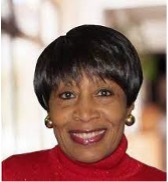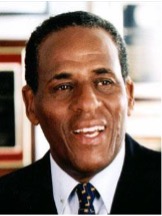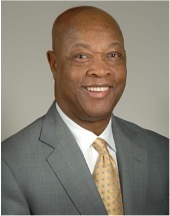Honorary Degrees 2020-2021
2021
 Harold P. Freeman, M.D.
Harold P. Freeman, M.D.
Honorary Doctor of Science
THE PREEMINENT AUTHORITY ON RACE, POVERTY, AND CANCER
He was nominated for exceptional distinction and contributions to medicine and advancing diversity and equity in the health and science professions.
Harold P. Freeman, M.D., is revered as a champion of health equity and justice for communities of color and at-risk populations. He was the chief architect of the American Cancer Society’s initiative on cancer among disadvantaged populations and an innovator who pioneered the Patient Navigator model of care. Among his many honors and accomplishments, Dr. Freeman served as national President of the American Cancer Society, four-term Chair of the President’s Cancer Panel, and Founding Director of the National Cancer Institute’s Center to Reduce Cancer Health Disparities. In addition, he is a 2000 Lasker Laureate.
Dr. Freeman earned his M.D. from Howard University Medical School (1958) and completed residencies at Howard University Hospital and Memorial Sloan Kettering Cancer Center. He is a Diplomat of the American Board of Surgery, a Fellow of the American College of Surgeons, and a member of the Institute of Medicine. Additionally, he is an Emeritus Professor of Clinical Surgery at Columbia University College of Physicians and Surgeons, Senior Advisor to the Director of the National Cancer Institute in Bethesda, Maryland, Director of Howard University, and a Trustee of Howard University Hospital.
When Dr. Freeman began his medical career in the 1970s, bias and discrimination in healthcare against minorities were common. Basic primary care was severely lacking for people of color and generally unavailable in the poorest communities. In addition, medical research on the health problems of African-Americans, particularly among African-American women, lagged significantly behind that of white Americans. As a result, African-Americans experienced higher morbidity and mortality rates than their white counterparts in nearly every disease category. Dr. Freeman’s life work has been committed to addressing these injustices and ensuring that all people receive the best possible care, regardless of their color or income.
Dr. Freeman is currently the Founder and President/CEO of the Harold P. Freeman Patient Navigation Institute, a healthcare model he pioneered that aims to improve healthcare by facilitating convenient and integrated care.
Dr. Freeman continues to challenge healthcare and medical research leaders to broaden their understanding and approach to human disease and remains committed to patients and his community.
2021
 Ali S. Khan, M.D., MPH, MBA
Ali S. Khan, M.D., MPH, MBA
Honorary Doctor of Science
A DISEASE DETECTIVE DEDICATED TO PROTECTING THE PUBLIC’S HEALTH
He was nominated for driving innovation in public health, combating emerging infectious diseases and bioterrorism, and skill in aligning national objectives with evolving science and political environments.
Ali S. Khan, M.D., MPH, MBA, is an expert on emerging infectious diseases, bioterrorism, and global health. He is a retired Assistant Surgeon General and the CDC’s former Director of the Office of Public Health Preparedness and Response. Dr. Khan currently serves as Dean and Professor of Epidemiology for the College of Public Health at the University of Nebraska. In addition, he authored The Next Pandemic: On the Front Lines Against Humankind’s Gravest Dangers, released in 2016.
Dr. Khan is a medical doctor by training and an epidemiologist by career, known for driving innovation in public health and leading organizational change. He served with the CDC from 1991 to 2014. While there, Dr. Khan gained a reputation for delivering results and initiating programmatic advances to address infectious diseases, food safety, global health, and health security.
During several successive appointments at the CDC, Dr. Khan was instrumental in aligning national objectives with evolving science and political environments. Many of his assignments responded to high-profile domestic and international public health emergencies. These included outbreaks of Ebola hemorrhagic fever, severe acute respiratory syndrome (SARS), the initial public health response to HurricaneKatrina, and the anthrax attack on the Senate Office Buildings in Washington, D.C.
Dr. Khan earned his M.D. degree, summa cum laude, from SUNY Downstate’s College of Medicine in 1987 and completed a combined residency in Internal Medicine and Pediatrics in 1991 at the University of Michigan Medical Center in Ann Arbor. In addition, he holds an MPH from Emory University and an MBA from the University of Nebraska.
In his current appointment as Dean of Public Health at the University of Nebraska, Dr. Khan has strengthened the College’s reach and advanced its reputation. He consults for multiple U.S. organizations (including Major League Baseball), Ministries of Health in foreign countries, and the World Health Organization.
2021

Monica Sweeney, M.D., MPH, FACP
Honorary Doctor of Science
A COMMUNITY HEALTH CHAMPION WHO SHAPED THE LOCAL, STATE, AND NATIONAL RESPONSE TO THE HIV/AIDS CRISIS
She was nominated in recognition of her extensive work to combat HIV/AIDS as New York City Assistant Commissioner of the Bureau of HIV/AIDS and a member of the U.S. Presidential Advisory Council on HIV/AIDS.
M. Monica Sweeney, M.D., MPH, FACP, is a champion for health equity and a public health advocate. She served two terms as a member of the U.S. Presidential Advisory Council on HIV/AIDS, was a former Assistant Commissioner of the Bureau of HIV/AIDS Prevention and Control in the NYC Department of Health and Mental Hygiene (DOHMH), and, for close to two decades, was director of a clinic in the heart of Brooklyn’s Bedford Stuyvesant community, an inner-city healthcare “desert” in which people of color continue to be affected by HIV/AIDS at epidemic levels.
Dr. Sweeney has received numerous awards for her work and is now Professor and Chair Emerita of Health Policy and Management at Downstate’s School of Public Health.
In 2007, Dr. Sweeney was appointed to head the Bureau of HIV/AIDS Prevention and Control in NYCHMH, which gave her a platform to address the HIV/AIDS epidemic across the five boroughs of New York City. Dr. Sweeney oversaw a comprehensive effort to improve HIV prevention, diagnosis, and treatment using surveillance data, medical home care, case management, and patient navigation techniques. She launched large-scale testing programs and expanded prevention campaigns. In addition, she deftly used the media to advance the Bureau’s mission.
The epidemiologic programs, techniques, tools, and prevention campaigns Dr. Sweeney launched during her tenure are DOHMH are still used as a foundation she laid to combat HIV/AIDS stigma, bias, and discrimination.
Dr. Sweeney earned her M.D. degree and completed her internship and residency training at SUNY Downstate’s College of Medicine. In addition, she holds an MPH from Columbia University’s Mailman School of Public Health. She is board-certified in Internal Medicine and Geriatric Medicine and is a Fellow of the American College of Physicians.
2020
 Daisy Cruz-Richman, Ph.D., R.N.
Daisy Cruz-Richman, Ph.D., R.N.
Honorary Doctor of Science
MAKING A DIFFERENCE BY RAISING THE PROFILE AND RIGOR OF NURSING EDUCATION
She was nominated for strengthening Nursing education nationally, working with the American Association of Colleges of Nursing (AACN) and the Robert Wood
Johnson Foundation.
Daisy Cruz-Richman, Ph.D., R.N., is Dean Emerita of SUNY Downstate’s College of Nursing. While Dean, she strengthened Nursing Programs at SUNY Downstate and throughout The State University of New York system, provided leadership to nationally essential programs, and strengthened academic rigor in the nursing profession in concert with the American Association of Colleges of Nursing (AACN) and the Robert Wood Johnson Foundation.
Downstate’s College of Nursing is one of the largest in New York State, with over 350 students. Under Dr. Cruz-Richman’s leadership, the College revised graduate and undergraduate Nursing curricula, launched the Accelerated Bachelor of Nursing Program, developed a Center for Nursing Scholarship and state-of-the-art Nursing Simulation Center, appointed the College’s first Associate Dean for Research and Innovations, and launched the College’s first Honor Society. In addition, she won more than $5M in grant funding from state and national sources to support Nursing Programs at Downstate.
In 2006, Dr. Cruz-Richman was one of 15 Nursing leaders charged by the AACN Board of Directors with revising its 1998 document, Essentials of Baccalaureate Education for Professional Nursing Practice. In 2012, she chaired the AACN’s national RN-BSN Task Force, which wrote its White Paper on Expectations for Practice Experiences in the R.N. to Baccalaureate Curriculum. In addition, she was a founding member of the Robert Wood Johnson Foundation’s “New Careers in Nursing” scholarship program, designed to increase the number of bachelor-prepared nurses in the workforce.
Dr. Cruz-Richman holds multiple advanced degrees in Nursing, Education, and Psychology. She served as a faculty member of Downstate’s College of Nursing from her initial appointment in 1979 until her retirement in 2017.
2020
 Eli A. Friedman, M.D., MACP
Eli A. Friedman, M.D., MACP
Doctor of Science
COMMANDING CONTRIBUTIONS TO THE FIELDS OF NEPHROLOGY AND DIALYSIS
He was nominated in recognition of his leadership and lifetime efforts to extend the lifesaving technology of dialysis to broader communities.
Eli A. Friedman, M.D., MACP, is one of the world’s most renowned figures in nephrology. Though he did not invent hemodialysis, Dr. Friedman was centrally involved in refining the techniques by which this lifesaving modality is applied. By developing the portable “suitcase dialyzer,” he added immeasurably to the ability of dialysis patients to live a relatively normal lifestyle.
Throughout his career, Dr. Friedman worked, collaborated with, or advised virtually every prominent clinician in end-stage renal disease and renal transplantation. In addition, he trained more than 160 nephrology fellows, many of whom went on to distinguished academic and clinical careers.
Before Dr. Friedman launched the first Federally-funded dialysis program in 1964 at Kings County Hospital Center, patients with chronic renal failure faced inevitable and imminent death. Since then, more than one million Americans have undergone the lifesaving procedure.
Dr. Friedman is a 1957 graduate of SUNY Downstate’s College of Medicine. He returned to Downstate in 1963 as an Assistant Professor of Medicine and Chief of the newly created Renal Disease Division. He spent his entire career in service at SUNY Downstate. He was appointed a SUNY Distinguished Teaching Professor in 1992 and formally retired in 2019.
Dr. Friedman has served as President, chairman, or member of numerous professional societies and committees. He has received 95 national and international honors, awards, and medals, including two honorary degrees, several lifetime achievement awards, and multiple designations on “Top Doctor” lists. He served as editor or on the editorial boards of 25 scientific journals and has more than 500 peer-reviewed journal articles and book chapters.
Dr. Friedman is a Master of the American College of Physicians and a Fellow of the Royal College of Physicians.
2020

Carl McCall, M.Div., DD., DHL
Doctor of Humane Letters
CHAIRMAN EMERITUS OF THE STATE UNIVERSITY OF NEW YORK: A LIFE DEDICATED TO PUBLIC SERVICE
He was nominated in recognition of his contributions to SUNY Downstate, New York State, and the nation and his impactful advocacy for social justice and community engagement.
The Honorable H. Carl McCall M.Div., DD., DHL., has led a storied life and has had an equally storied impact on New York State, the nation, and the hundreds of thousands of students who attended SUNY. At the same time, he served as a Member and Chair of its Board of Trustees. In addition, he is a civil rights activist, astute business leader, and champion for access and equality in higher education who, over the course of his career, has served as a New York State Senator, ordained minister, Ambassador to the United Nations, Commissioner of the New York State Division of Human Rights, Commissioner of the Port Authority of New York and New Jersey, New York State Comptroller, and Board member of the New York Stock Exchange.
Under Mr. McCall’s leadership, SUNY initiated programs and policies that defined the core values of the State University of New York. These programs and policies include a system-wide diversity policy, expansion of Educational Opportunity Programs, implementation of the most robust measures in the nation to prevent sexual assault on college campuses, the end of criminal conviction disclosure in SUNY admissions, and implementation of a system-wide initiative to increase the number of underrepresented faculty.
SUNY appointed 93 College Presidents, Officers-in-Charge, and Deans on Mr. McCall’s watch. He oversaw the adoption of multiple international exchange agreements with Haiti, the Dominican Republic, and Cuba. Additionally, he created the SUNY Impact Foundation, the first foundation dedicated to serving the needs of SUNY students system-wide.
On retirement from the Board of Trustees in 2019, Mr. McCall was appointed Chairman Emeritus in recognition of his many years of service and his ongoing involvement in providing expertise to the Board.
Mr. McCall was educated at Dartmouth College, Andover Newton Theological Seminary, and Edinburgh University. He is the recipient of ten honorary degrees.
2020
 John Ruffin, Ph.D.
John Ruffin, Ph.D.
Doctor of Science
FOUNDING DIRECTOR OF THE NATIONAL INSTITUTE ON MINORITY HEALTH AND HEALTH DISPARITIES
He was nominated for elevating the national discourse on minority health and launching health disparities research to the status of scientific discipline.
John Ruffin, Ph.D., has devoted his career to improving the health status of racial and ethnic minorities and underserved populations. As the NIH federal official for minority health disparities research, Dr. Ruffin planned and brought to fruition the most extensive biomedical research program in the nation to eliminate health disparities. Over his more than 20-year career at the NIH, he transformed research on minority health and health disparities from a programmatic concept to a fully-realized entity that touches the lives of millions of Americans burdened by inequalities in health status and healthcare delivery.
Dr. Ruffin retired from the NIH in 2014. He currently serves as a Senior Fellow with the Cobb Institute, which functions as a community of researchers and practitioners who advance evidence-based solutions for racial and ethnic disparities in health and healthcare. After retirement, Dr. Ruffin published “Going the Distance: The Making of a National Health Disparities Research Enterprise,” which chronicles the birth and evolution of the minority health and health disparities research agenda.
Dr. Ruffin earned a Ph.D. in Systematic and Developmental Biology from Kansas State University and completed post-doctoral studies at Harvard University. He has also served as a Cabot Teaching Fellow at Harvard University and Dean of the College of Arts & Sciences at North Carolina Central University.
Dr. Ruffin’s record of professional achievement includes ten honorary Doctor of Science degrees. He has given hundreds of presentations and keynote speeches on health disparities to agencies, scientific organizations, organizations, and universities and delivered testimony to Commissions and Congress. He has received numerous awards from professional, non-profit, and advocacy organizations.